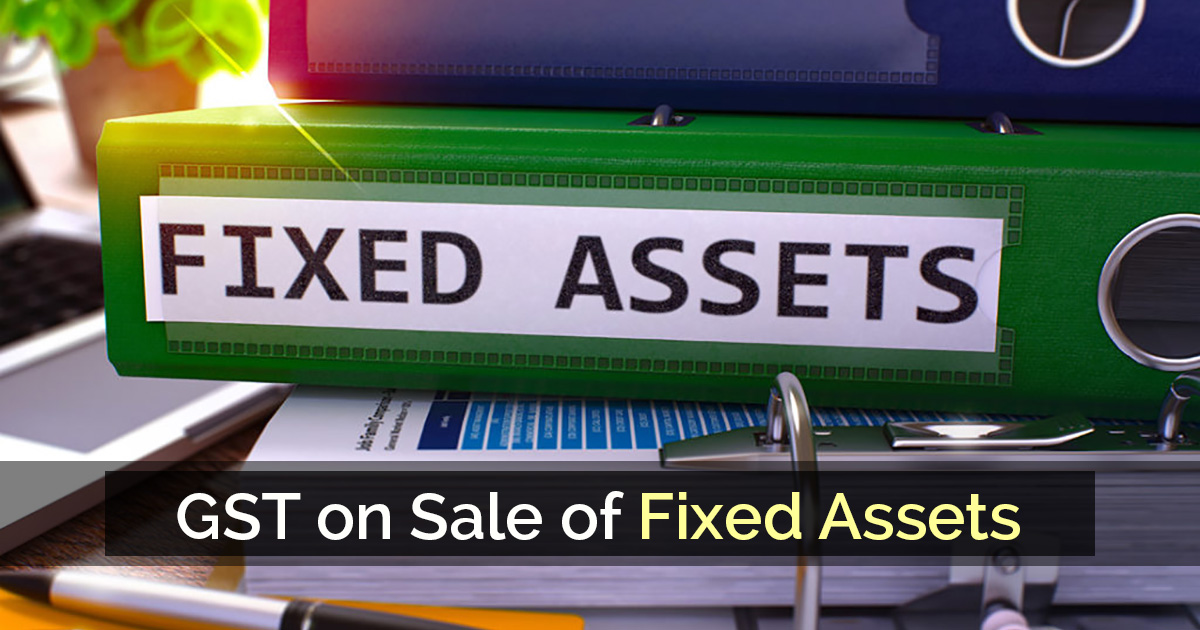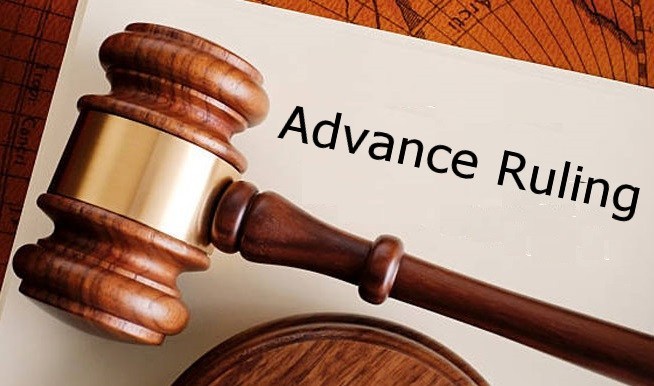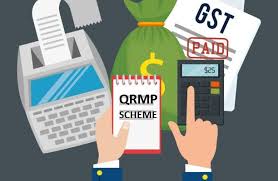As per para 6.1 of Accounting Standard 10 ” Accounting of Fixed Asset” Fixed asset is an asset held with the intention of being used for the purpose of producing or providing goods or services and is not held for sale in the normal course of business.
Considering the enduring benefit that a business derives from a Fixed Asset , the same are capitalized in the books of accounts and same are subjected to depreciation over the useful life of such fixed asset. It may be noted that under Indian Accounting Standard (Ind. AS) which are applicable on big corporates , the Fixed Assets are referred to as Property, Plant and Equipment.
It may be common for every business to sale the fixed assets that were used for business purposes after they complete their useful life or due to obsolescence or closure / sale of business or any other reason.
In this article we shall discuss about the GST implications on sale of Fixed Assets which have earlier been used for business purposes, other than motor vehicles. For understanding about GST on old motor vehicles please refer to our article All about GST on sale of old and used motor vehicles
Sale of Fixed asset: subject to GST?
We all know that GST is a tax on supply of goods or services or both. Thus in order to determine whether the transaction of sale of fixed asset would be subject to GST or not we need to answer two questions:
Firstly whether Fixed assets are goods or services as only transactions of goods or services or both can be exigible to GST. For this we need to refer to the definitions of good and services provided under Section 2 (52) and 2(102) of the CGST Act, 2017, respectively, and
Secondly whether sale of fixed assets would qualify as ‘supply’, for which Section 7 of the CGST Act, 2017 is to be referred to.
Fixed Assets : Goods or Services?
Before deliberating as to whether Fixed Assets are Goods or Services. Lets first refer to the definitions of ‘Goods’ as well as ‘Services’ mandated under the GST Law.
As per Section 2(52) of the CGST Act, 2017 ‘goods’ means every kind of movable property other than money and securities but includes actionable claim, growing crops, grass and things attached to or forming part of the land which are agreed to be served before supply or under contract of supply.
The expression ‘ Services’ are defined under Section 2(102) of the CGST Act, 2017 according to which “services” means anything other than goods, money and securities but includes activities relating to the use of money or its conversion by cash or by any other mode, from one form, currency or denomination, to another form, currency or denomination for which a separate consideration is charged;
Explanation.–– For the removal of doubts, it is hereby clarified that the expression ‘services’ includes facilitating or arranging transactions in securities;
After reading the above definitions , we can safely say that fixed assets which are movable in nature like Motor vehicles, Computers, Furniture, Plant and Machinery are ‘Goods’ under the GST Law.
Now the question remains what would be the treatment of fixed assets which are immoveable in nature like land, building. In this regard , if we refer to the definition of Services we would note that it has been defined as anything other than goods and thus virtually sky is the limit for its coverage and it may appear that sale of land and building would be regarded as services under GST Law. However this doesn’t mean same would be taxable. We shall deliberate upon taxability little later in the article.
Is Sale of Fixed Asset a Supply?
As per Section 7(1)(a) of the CGST Act, the expression ‘supply’ includes all forms of supply of goods or services or both such as sale, transfer, barter, exchange, license, rental or disposal made or agreed to be made for a consideration by a person in the course or furtherance of business.
We have already discussed in the preceding para that Movable Fixed Assets would be regarded as Goods and Immoveable Fixed Assets as Services and therefore Sale of Fixed Assets made for a consideration in the course or furtherance of business would be treated as “Supply” under GST Law and thus be subject to GST.
Sale regarded as supply even if made without consideration
We just read that as per Section 7(1)(a) presence of consideration is must in order for a transaction being regarded as supply and consequently subjected to GST. However in regard to Fixed Assets there can be certain situations where they are sold / disposed without any consideration and still subject to GST. These situations are given below:
i) Sale of Fixed Assets on which ITC has been availed:
As per para 1 of Schedule I of CGST Act 2017, Permanent transfer or disposal of business assets (which would include fixed assets) where input tax credit has been availed on such assets is treated as a supply even if made without consideration.
Example: In case a business entity had purchased laptops and availed ITC thereon and after some period wants to give such laptops as donation to any NGO. In such cases as ITC was availed such donation of laptops will be hit by para of Schedule I and such transaction will be exigible to GST. The determination of value on which GST will be paid, will be discussed later in the article.
ii) Sale of Fixed Assets to related persons or between distinct persons:
As per para 2 of Schedule I of CGST Act 2017 Supply of goods or services or both between related persons or between distinct persons as specified in section 25, when made in the course or furtherance of business is treated as a supply even if made without consideration. However gifts not exceeding Rs 50,000/- in value in a financial year by an employer to an employee shall not be treated as supply of goods or services or both.
Distinct Person
As per Section 25 (4) of CGST Act 2017 “ If a person has obtained or is required to obtain more than one registration, whether in one state or union territory or more than one state or union territory shall, in respect of each such registration, be treated as distinct persons for the purposes of this Act”.
Related Person
As per Explanation to Section 15 of CGST ACT 2017
Persons shall be deemed to be “related persons” if––
(i) such persons are officers or directors of one another’s businesses;
(ii) such persons are legally recognized partners in business;
(iii) such persons are employer and employee;
(iv) any person directly or indirectly owns, controls or holds twenty-five per cent. or more of the outstanding voting stock or shares of both of them;
(v) one of them directly or indirectly controls the other;
(vi) both of them are directly or indirectly controlled by a third person;
(vii) together they directly or indirectly control a third person; or
(viii) they are members of the same family;
(b) the term “person” also includes legal persons;
(c) persons who are associated in the business of one another in that one is the sole agent or sole distributor or sole concessionaire, howsoever described, of the other, shall be deemed to be related.
So in case of supply between related person or distinct person when made in course or furtherance of business will be taxable even made without consideration as per above explanations
Example: A Branch of X Ltd in Delhi sends some Computers without any consideration to another branch of X Ltd in Haryana. As both branches are in different States and would have separate GST registrations (thus being distinct persons) , such transaction would be regarded as supply despite no consideration being involved.
Sale of Fixed Asset as part of sale of going concern is an exempted supply
As per Entry 2 of Notification No.12/2017- Central Tax (Rate) dated 28.06.2017 (as amended) Services by way of transfer of a going concern, as a whole or an independent part thereof is fully exempted from payment of GST.
Accordingly where a business along with fixed assets is being sold as a going concern , as a whole or an independent part thereof , such supply of service is an exempted supply and thus no GST would be payable on such transaction.
Sale of land and completed building is not a supply and thus not subject to GST
We just discussed earlier that sale of immoveable property would be regarded as supply of services under GST as the expression ‘services’ has been defined in a very broad manner to mean anything other than goods. However it doesn’t mean all immoveable properties will be subjected to GST.
In this regard it is important to refer here to Para 5 of Schedule III of the CGST Act, 2017 according to which sale of land and building (where the entire consideration is received after issuance of completion certificate or after first occupation, whichever is earlier) is treated neither as supply of goods nor a supply of services.
Accordingly in case a business entity has sold its land or any factory or office building , there will be GST implications thereon. The reason for excluding these is that they are subject to stamp duty by State which has not been subsumed under GST Law.
Value on which GST is payable
From above discussions we must be clear that sale of fixed assets are supply and subject to GST , except when sold as part of sale of going concern or sale of land and completed building. Now question arises how the sale will be valued , specially in cases where no consideration is involved and what would be the implications where a fixed asset on which ITC has been availed is sold.
Lets discuss the valuation in various situations as under:
Situation-I : Sale of Fixed Asset (on which ITC was not availed) for a consideration
In such cases the transaction value i.e. sale price would be regarded as value of supply as per provisions of Section 15 (1) of the CGST Act, 2017. It would include certain amounts as mandated under sub-section (2) of Section 15 and shall not include discount as per Section 15(3).
However in case the supply is made to a related person / distinct person the transaction value will be disregarded and valuation be made as per Rule 28 / 30/ 31 of the CGST Rules, 2017 discussed in succeeding para.
Situation-II : Sale of Fixed Asset (on which ITC was not availed), without consideration to related / distinct person
We have already discussed earlier that supply to related / distinct persons even if made without consideration will be treated as supply. Further in cases where consideration is there, the transaction value in cases of supply to related / distinct persons is disregarded and value is determined as per CGST Rules, 2017.
In such cases as per Rule 28 of the CGST Rules, 2017 the value of taxable supply will be determined as under:
1. The Open Market Value (OMV) of such supply. OMV will be the amount which is fairly available in open market.
2. If the open market value is not available, it will be the value of supply of goods or services of like, kind and quantity. Here, the taxable person can use as reference similar goods or services or both for determining the value of supply.
3. If the value is not determinable in the above two cases it shall be determined by either by the Cost Method (rule 30) or Residual Method (Rule 31).
It may be noted here that if the recipient of goods or services (or both) is eligible for full input tax credit, the value declared in the invoice shall be deemed to be the open market value of goods or service.
Situation-III: Sale of Fixed Asset (on which ITC was not availed), without consideration to a unrelated / not a distinct person
Such sale of fixed assets without any consideration to a person who is not a related person / distinct person will not be regarded as supply as per section 7(1)(a) of the CGST Act, 2017 and thus there will be no GST implications.
Situation-IV : Sale of Fixed Asset (on which ITC was availed) with / without consideration
The input tax credit is admissible on amount of GST paid on Fixed Assets which are used in the course or furtherance of business and credit of which is not blocked under Section 17(5) of the CGST Act, 2017 viz motor vehicles (passenger vehicles having seating capacity upto 13 (including driver)).
Input Tax Credit on fixed assets is admissible as these are ‘Capital goods’. At this juncture it is important to refer to the definition of the expression ‘Capital goods’ which is mandated under section 2(19) of the CGST Act, 2017 and for ready reference is reproduced below:
“capital goods” means goods, the value of which is capitalised in the books of account of the person claiming the input tax credit and which are used or intended to be used in the course or furtherance of business.
From above definition we can infer that the fixed assets for qualifying the Goods as a Capital goods following conditions should be satisfied.
1) Goods should be capitalised in the Books of Accounts. (This condition is satisfied for Fixed Assets as they are capatalised in books).
2) ITC Should be availed on such goods. (It would be admissible if the fixed assets are used for business and credit is not blocked u/s 17(5)).
3) Such goods should be used in the course or furtherance of business. (This is universal condition for availing of ITC).
As per Section 18(6) of the CGST Act read with Rule 40(2) & 44(6) of the CGST Rules, if capital goods or plant and machinery on which ITC has been taken are supplied by the registered person , he must pay an amount that is higher of the following:
- ITC taken on such goods reduced by 5% per quarter* of a year or part thereof from the date of issue of invoice for such goods (i.e. ITC pertaining to remaining useful life of the capital goods (in quarters)) or
- tax on transaction value as determined under Section 15 of the CGST Act, 2017.
Where the amount so determined exceeds the tax payable on the transaction value of the capital goods , such amount need to be paid and thus, should be added to the output tax liability.
However if refractory bricks, moulds and dies , jigs and fixtures are supplied as scrap, the taxable person may pay tax on the transaction value.
*Note: Under rule 44(6) , ITC involved in the remaining useful life (in months) of the capital goods is reversed on pro rata basis , taking the useful life as 5 years.
It is important to note here that ITC pertaining to remaining useful life of the capital goods should be computed separately for ITC of CGST, SGST / UTGST and IGST.
Also Read: All about Input Tax Credit on Motor Vehicles under GST Law
We hope you had liked our article. However in case you feel any issue has been left out in discussion please feel free to write us at info@clearmytax.in.
Follow us for free tax updates : facebook Twitter
***
Subscribe our portal and get FREE Tax e-books , quality articles and updates on your e-mail.
Resolve your GST queries from national level experts on GST free of cost.
Frah Saeed is a law graduate specializing in the core field of indirect taxes and is the Co-founder of taxwallah.com. She has authored many publications on GST and is into full-time consultancy on GST to big corporates. She as a part of taxwallah.com heads a team comprising of Chartered Accountants and Advocates and plays a key role in our mission to disseminate GST knowledge to all.




